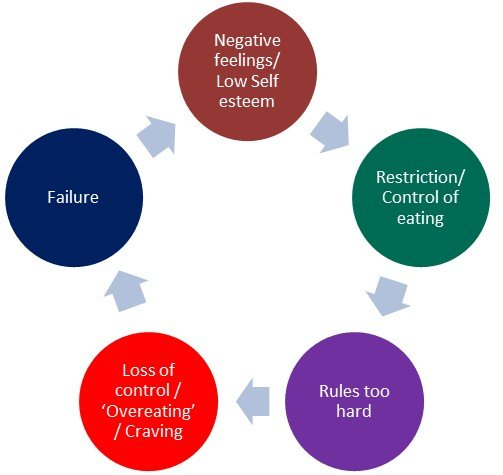It is hard from an outside perspective to truly understand eating disorders and disordered eating. We have guidelines from the DSM-V to help diagnosis an eating disorder and the different types of eating disorders; however, most times than not, people experience cycling between the different types of eating disorders. Not everyone with an eating disorder is underweight, in fact, most individuals with an eating disorder are at a “normal” weight. Not every eating disorder looks the same. Not every anorexic individual “just” restricts food and is severely underweight, not every bulimic individual just binges and purges, and not every binge eater just binge eats. Eating disorders often overlap and symptoms for each type may be present. In addition, individuals may cycle between the different types of eating disorders. That being said, it is important to take a holistic approach in the treatment of an eating disorder and focus on the individual and not just the diagnosis.
I often see a cycle in eating disorder behaviors. Many individuals restrict food intake as a means to lose weight and/or fear of gaining weight. This behavior often causes individuals to binge eat or overeat resulting in purging, over-exercising, and/or negative thoughts and feelings about themselves. A “binge” or eating in general can cause immense guilt and shame. This results in the individual again engaging in the restrictive cycle of their eating disorder. I often demonstrate the cyclical behavior to my clients: negative thoughts/feelings → food restriction→ hunger and/or negative experiences → binge eating or “just eating” → guilt and shame → cycle starts over.
This is also a clear example of why diets do not work. We, as a society, place an emphasis on dieting throughout the week and categorize foods as “healthy and unhealthy”. We then only eat the “healthy foods” during the week and deprive our body of what it is telling us that we need/want. Individuals then overeat these foods on weekends, “cave” and eat these foods during the week, and or both. This is often associated with negative self-feelings such as guilt, shame, and failure. Dieting often causes food to be the enemy and reason for unhappiness. In reality, food is our body’s fuel, not the enemy. Diets often do not work because they are unsustainable. We tell ourselves we cannot have it thus giving food so much power in our lives that when we do eat it we experience negative feelings about it.
So how do we stop this cycle? First, it is not an easy question to answer. I encourage my clients to practice listening to their bodies hunger/fullness cues. These cues can often be interrupted and misconstrued for someone with an eating disorder. I encourage my clients to follow their meal plan and meal schedule until he or she is at a place in recovery where they can start listening to his or her hunger/fullness cues. Individuals may be at a healthy weight and making meal plan, but it does not mean the mind is ready for intuitive eating as feelings often dictate appetite. Second, incorporate a variety of foods at each meal and snack. This will allow your body to receive the nutrients and energy it needs. Third, allow yourself to enjoy all foods in moderation. Certain foods make us feel more satisfied than others. Think about eating a salad with chicken. Now think about eating chicken, potatoes, salad, and a dessert. I guarantee you the latter will make you feel satisfied and decrease the urges to binge and overeat. You are allowing yourself to fuel your body and mind because the two go hand in hand! Lastly, practice self-acceptance because you are worthy to enjoy all foods!
Authored by Emily Baum, M.S., RDN, LD



